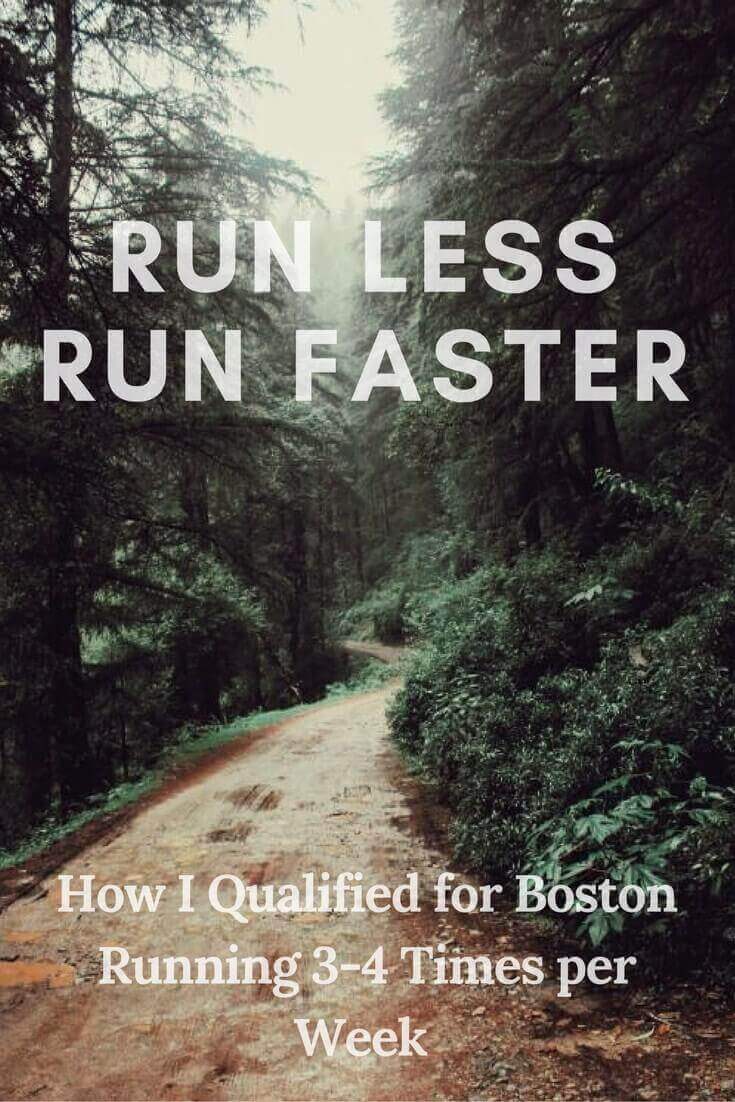Run Less Run Faster: How I Qualified for Boston Running 3-4 days a Week

Hi! Happy Thursday!
For the amount that I run/workout, I definitely don’t talk about it enough on my blog. I have lots of knowledge/experience when it comes to running, strength training, and cross training and have decided to start making that more prominent on my blog. That’s why today I am linking up with some other experienced runners to talk about how to make the most out of your runs by reducing the amount of times you run per week.
Run less & get faster?? That doesn’t sound too logical initially does it?? BUT- it can work great for people that are injury prone, get burnt out easily, or have a history of over training. I personally am injury prone as I have had some injuries in the past when I wasn’t taking care of my body as well. Using this approach of running less has helped me to ward off injuries while still getting faster. I even was able to qualify for the Boston Marathon at my first full marathon this spring using this method. If you are looking to get faster and up your fitness level, but constantly find yourself in a cycle of injury/rehab or always feel fatigued and burnt out then you should definitely consider this method.
There is actually a book on this training method called “Run Less Run Faster” which is very similar to my approach. You would probably guess that I have read this book due to how I train, but I have only read a couple of reviews of the book online.
Here’s how to do it:
Step 1.
3-4 QUALITY runs per week. These runs include one progressive/up-tempo run, one long run, one easy shakeout run, and a track/interval workout. When I am marathon training I have a strict policy of “no junk miles”. That means every run has a purpose. I try to avoid lots of “easy” or “moderate” miles because they don’t make me any better and put more stress and strain on my muscles than I need. Alternate your run days with your cross training days as best you can.
Step 2.
2-3 Cross Training Workouts per week. These include cycling/biking, swimming, rowing, or using another cardio machine like the elliptical/stairmaster (beware of potential knee issuing using the stairmaster). Try to push yourself to a moderate/difficult level when cross training to maximize your endurance levels and improve your overall fitness. That way you can improve your running speed without all of the pressure and stress on the joints.
Step 3.
3-4 Strength Training Sessions Per Week. These sessions are meant to last 15-30 minutes and can be tacked onto the end of your run/cross training workout. It is important to do accessory work as a runner and various strength training workouts to help fend off injury and keep your muscles and bones strong. I am going to do another post on the strength training workouts I do each week, but if you are looking for a place to start then try dynamic body movements using lots of muscle groups like burpees, weighted lunges and planks, single leg dead lifts, bridge/glut raises, chest/bench press, tricep dips, and resistance band work.
Step 4.
RECOVERY. Recovering from a tough workout is SO important. Invest in a foam roller, compression socks, quality hydration sources (I love Nuun), and a yoga mat. Stretch out after your runs and before you go to bed. Doing all of the little things adds up and can really make a difference in your training.
Here’s a little example of what a typical training week looks like for me.
Sunday: Long Run 10-20 miles (depending on what I am training for)
Monday: Cross Train on the Spin Bike – 45min-1 hr intervals + Upper Body
Tuesday: Tempo Run 6-9 miles + lower body strength training
Wednesday: Cross Train on the Bike, Elliptical, Or Stair Mill + easy Body Wt. exercises
Thursday: Interval Run -Mile or 800 Repeats, 5k fast, etc- total 5-8 miles) + More strength training
Friday: Off or Active Recovery (easy yoga, hiking, walking, stretching, etc)
Saturday: Easy shakeout 2-4 miles + 1 hr Yoga
Each week for me is a little bit different, but this is often what it looks like. I change up my rest days or the days of the week that I do certain runs/ workout based on what I am feeling or what my body is telling me. This method has been working for me for the past two years. It helps me to prevent being burnt out when I run and helps me to prevent injury.
Tell me below:
Do you think you can run less and get faster?? Do you run every day?? Have you followed a marathon training plan in the past?? What is your favorite??
